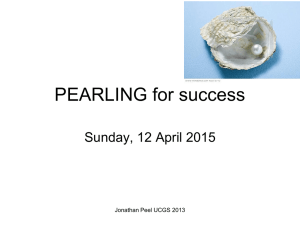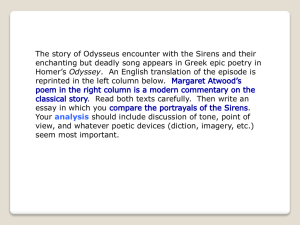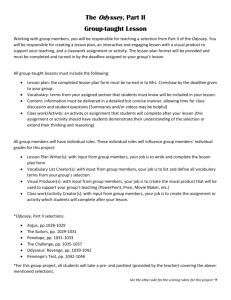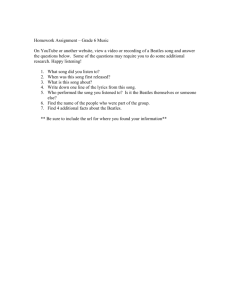poems
advertisement
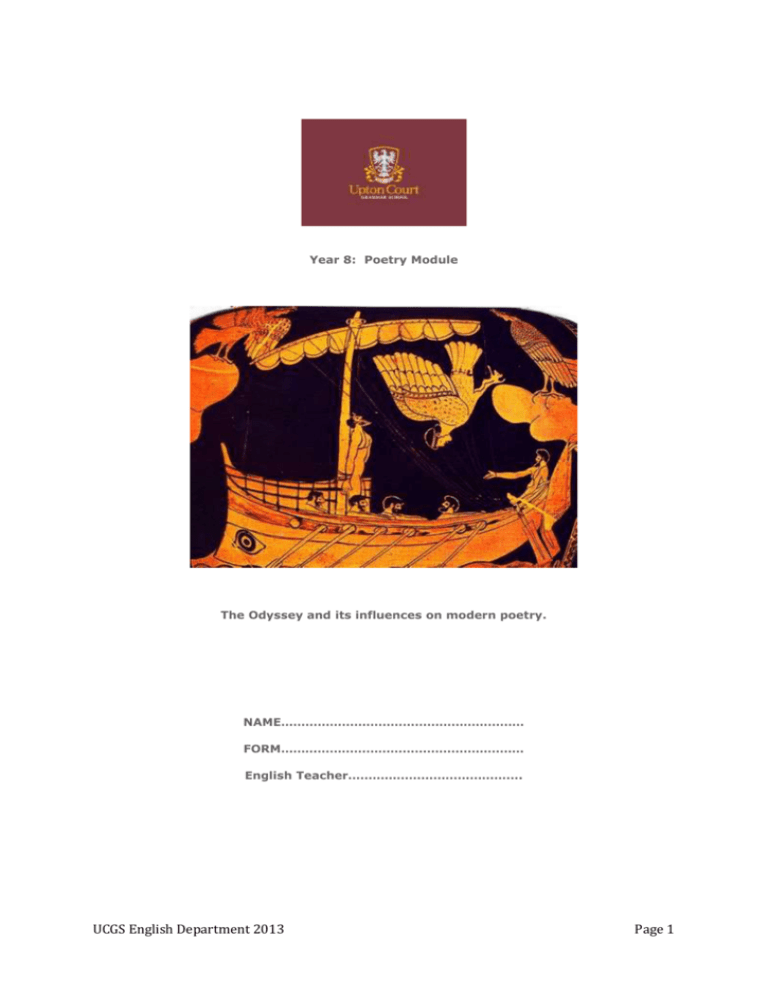
Year 8: Poetry Module The Odyssey and its influences on modern poetry. NAME…………………………………………………… FORM…………………………………………………… English Teacher……………………………………. UCGS English Department 2013 Page 1 UCGS English Department 2013 Page 2 Key elements from the Odyssey: Fall of Troy Polyphemus Book ix Sirens Book Xii Circe Return/Penelope Bow firing UCGS English Department 2013 Page 3 The Blinding Of Polyphemus Discoid, huge, shining like the sun redder, though, and far more irritated shocking to see, pulsing, infiltrated, starred with veins and veins, the one sole eye of Polyphemus shone wicked, hippic and dilated with the drink it had absorbedhooded, half, in drowsy-drunken slumber. The cave, the cave stank of sheeps' dung and nard and shook, shook with the grumblings of thunder while the fire higher burned fed by the mast they'd sharpened and prepared, and when it closed in full he gave the word: seven men (it took at least that many) hoisted the pike and starting from the rear swallowing their fear ran with gathering steam against the heavy lidded orb, buryin the fired point like a fork into a melon into the sinkhole of light on which, therefore, darkness closed foreverlife would be better from now on. Then with a ruse that every child knows each a-clutch a rams' wooley belly escaped to the ship and sailed over the horizon; Yet he couldn't resist a backward quip even to the backwards son of Neptune he was the Ulysses, after all, deft and clever, and thinking perhaps of Penelope's weaving arms, one better answered the tyrants' vain enquiries: No one did it! Check the spelling. No one! robert dickerson UCGS English Department 2013 Page 4 Odysseus escapes Polyphemus: Homer, Odyssey ix ‘As he finished speaking I handed him the bright wine. Three times I poured and gave it to him, and three times, foolishly, he drained it. When the wine had fuddled his wits I tried him with subtle words: “Cyclops, you asked my name, and I will tell it: give me afterwards a guest gift as you promised. My name is Nobody. Nobody, my father, mother, and friends call me.” Those were my words, and this his cruel answer: “Then, my gift is this. I will eat Nobody last of all his company, and all the others before him”. As he spoke, he reeled and toppled over on his back, his thick neck twisted to one side, and all-conquering sleep overpowered him. In his drunken slumber he vomited wine and pieces of human flesh. Then I thrust the stake into the depth of the ashes to heat it, and inspired my men with encouraging words, so none would hang back from fear. When the olivewood stake was glowing hot, and ready to catch fire despite its greenness, I drew it from the coals, then my men stood round me, and a god breathed courage into us. They held the sharpened olivewood stake, and thrust it into his eye, while I threw my weight on the end, and twisted it round and round, as a man bores the timbers of a ship with a drill that others twirl lower down with a strap held at both ends, and so keep the drill continuously moving. We took the red-hot stake and twisted it round and round like that in his eye, and the blood poured out despite the heat. His lids and brows were scorched by flame from the burning eyeball, and its roots crackled with fire. As a great axe or adze causes a vast hissing when the smith dips it in cool water to temper it, strengthening the iron, so his eye hissed against the olivewood stake. Then he screamed, terribly, and the rock echoed. Seized by terror we shrank back, as he wrenched the stake, wet with blood, from his eye. He flung it away in frenzy, and called to the Cyclopes, his neighbours who lived in caves on the windy heights. They heard his cry, and crowding in from every side they stood by the cave mouth and asked what was wrong: “Polyphemus, what terrible pain is this that makes you call through deathless night, and wake us? Is a mortal stealing your flocks, or trying to kill you by violence or treachery?” Out of the cave came mighty Polyphemus’ voice: “Nobody, my friends, is trying to kill me by violence or treachery.” To this they replied with winged words: “If you are alone, and nobody does you violence, it’s an inescapable sickness that comes from Zeus: pray to the Lord Poseidon, our father.” UCGS English Department 2013 Page 5 ODYSSEY XII SIREN SONG: This is the one song everyone would like to learn: the song that is irresistable: the song that forces men to leap overboard in squadrons even though they see the beached skulls the song nobody knows because anyone who has heard it is dead, and the others can’t remember Shall I tell you the secret and if I do, will you get me out of this bird suit? I don’t enjoy it here squatting on this island looking picturesque and mythical with these two feathery maniacs, I don’t enjoy singing this trio, fatal and valuable. I will tell the secret to you, to you, only to you. Come closer. This song is a cry for help: Help me! Only you, only you can, you are unique At last. Alas it is a boring song but it works every time. — Margaret Atwood, 1976 — UCGS English Department 2013 Page 6 Odyssey xii First to the Sirens ye shall come, that taint The minds of all men, whom they can acquaint With their attractions. Whomsoever shall, For want of knowledge moved, but hear the call Of any Siren, he will so despise Both wife and children, for their sorceries, That never home turns his affection's stream, Nor they take joy in him, nor he in them. The Sirens will so soften with their song (Shrill, and in sensual appetite so strong) His loose affections, that he gives them head. And then observe: They sit amidst a mead, And round about it runs a hedge or wall Of dead men's bones, their wither'd skins and all Hung all along upon it; and these men Were such as they had fawn'd into their fen, And then their skins hung on their hedge of bones. Sail by them therefore, thy companions Beforehand causing to stop every ear With sweet soft wax, so close that none may hear A note of all their charmings. Yet may you, If you affect it, open ear allow To try their motion; but presume not so To trust your judgment, when your senses go So loose about you, but give straight command To all your men, to bind you foot and hand Sure to the mast, that you may safe approve How strong in instigation to their love Their rapting tunes are. If so much they move, That, spite of all your reason, your will stands To be enfranchised both of feet and hands, Charge all your men before to slight your charge, And rest so far from fearing to enlarge That much more sure they bind you. 60 65 70 75 80 85 Trans Alexander Pope UCGS English Department 2013 Page 7 ‘So I explained everything to my friends, while our well-built vessel, borne on a gentle breeze, quickly neared the island of the Sirens. Suddenly the wind dropped, and a breathless calm followed, as some god lulled the waves. My comrades rose and furled the sail, then stowed it, then sat to their oars and thrashed the water with the blades of polished pine. I, in the meantime, sliced a large cake of beeswax with my sword-edge, and kneaded the slivers in my strong hands until the pressure and the rays of Lord Helios Hyperion heated it. Then I plugged the ears of each of my friends, and they tied me hand and foot and stood me upright in the mast housing, and fastened the rope ends round the mast itself. Then sitting down again, they struck the grey water with their oars. We drove past swiftly, but when we were within hail of the shore, the Sirens could not fail to see our speeding vessel, and began their clear singing: “Famous Odysseus, great glory of Achaea, draw near, and bring your ship to rest, and listen to our voices. No man rows past this isle in his dark ship without hearing the honeysweet sound from our lips. He delights in it and goes his way a wiser man. We know all the suffering the Argives and the Trojans endured, by the gods’ will, on the wide plains of Troy. We know everything that comes to pass on the fertile Earth.” This was the haunting song the Sirens sang, and I longed to listen, commanding my crew by my expression to set me free. But they bent to their oars and rowed harder, while Perimedes and Eurylochus rose and tightened my bonds and added more rope. Not till they had rowed beyond the Sirens, so we no longer heard their voices and song, did my loyal friends clear the wax that plugged their ears, and untie me.’ UCGS English Department 2013 Page 8 Dante Gabriel Rossetti The Wine of Circe Year written: 1869 Written for the picture 'The Wine of Circe' by Sir Edward Burne-Jones. Large watercolour, 1863-9. Crouching Circe puts potion in jar, as new ships put into her harbour; black panthers, ex-sailors, earlier potion drinkers, snuffle about their female bewitcher. Exhibited 1869. Dusk-haired and gold-robed o'er the golden wine She stoops, wherein, distilled of death and shame, Sink the black drops; while, lit with fragrant flame, Round her spread board the golden sunflowers shine. Doth Helios here with Hecate combine (O Circe, thou their votaress?) to proclaim For these thy guests all rapture in Love's name, Till pitiless Night give Day the countersign? Lords of their hour, they come. And by her knee Those cowering beasts, their equal heretofore, Wait; who with them in new equality To-night shall echo back the unchanging roar Which sounds forever from the tide-strown shore Where the dishevelled seaweed hates the sea. UCGS English Department 2013 Page 9 Circe I’m fond, nereids and nymphs, unlike some, of the pig, of the tusker, the snout, the boar and the swine. One way or another, all pigs have been mine – under my thumb, the bristling, salty skin of their backs, in my nostrils here, their yobby, porky colognes. I’m familiar with hogs and runts, their percussion of oinks and grunts, their squeals. I’ve stood with a pail of swill at dusk, at the creaky gate of the sty, tasting the sweaty, spicy air, the moon like a lemon popped in the mouth of the sky. But I want to begin with a recipe from abroad which uses the cheek – and the tongue in cheek at that. Lay two pig’s cheeks, with the tongue, in a dish, and strew it well over with salt and cloves. Remember the skills of the tongue – to lick, to lap, to loosen, lubricate, to lie in the soft pouch of the face – and how each pig’s face was uniquely itself, as many handsome as plain, the cowardly face, the brave, the comical, noble, sly or wise, the cruel, the kind, but all of them, nymphs, with those piggy eyes. Season with mace. Well-cleaned pig’s ears should be blanched, singed, tossed in a pot, boiled, kept hot, scraped, served, garnished with thyme. Look at that simmering lug, at that ear, did it listen, ever, to you, to your prayers and rhymes, to the chimes of your voice, singing and clear? Mash the potatoes, nymph, open the beer. Now to the brains, to the trotter, shoulders, chops, to the sweetmeats slipped from the slit, bulging, vulnerable bad of the balls. When the heart of a pig has hardened, dice it small. Dice it small. I, too, once knelt on this shining shore Watching the tall ships sail from the burning sun like myths; slipped off my dress to wade, breast-deep, in the sea, waving and calling; then plunged, then swam on my back, looking up as three black ships sighed in the shallow waves. Of course, I was younger then. And hoping for men. Now, Let us baste that sizzling pig on the spit once again. Carol Ann Duffy UCGS English Department 2013 Page 10 Penelope By Carol Ann Duffy with heroism’s boy At first, I looked along the road in a wild embroidery of love, lust, lessons learnt; hoping to see him saunter home then watched him sail away among the olive trees, into the loose gold stitching of the sun. a whistle for the dog And when the others came to take his place, who mourned him with his warm head on my disturb my peace, knees. I played for time. Six months of this I wore a widow’s face, kept my head down, and then i noticed that whole days had passed did my work by day, at night unpicked it. without my noticing. I knew which hour of the dark the moon I sorted cloth and scissors, needle, thread, would start to fray, thinking to amuse myself, I stitched it. but found a lifetime’s industry instead. Grey threads and brown I sewed a girl pursued my needle’s leaping fish under a single star—cross-stitch, silver silk— to form a river that would never reach the sea. running after childhood’s bouncing ball. I tried it. I was picking out I chose between three greens for the grass; the smile of a woman at the centre a smoky pink, a shadow’s grey of this world, self-contained, absorbed, content, to show a snapdragon gargling a bee most certainly not waiting, I threaded walnut brown for a tree, when I heard a far-too-late familiar tread outside my thimble like an acorn the door. pushing up through umber soil. I licked my scarlet thread Beneath the shade and aimed it surely at the middle of the needle’s I wrapped a maiden in a deep embrace eye once more. UCGS English Department 2013 and lost myself completely Page 11 Odysseus' Decision The great man turns his back on the island. Now he will not die in paradise nor hear again the lutes of paradise among the olive trees, by the clear pools under the cypresses. Time begins now, in which he hears again that pulse which is the narrative sea, at dawn when its pull is strongest. What has brought us here will lead us away; our ship sways in the tinted harbor water. Now the spell is ended. Give him back his life, sea that can only move forward. Louise Gluck UCGS English Department 2013 Page 12 Penelope serves Odyusseus Breakfast: Karen Bjorneby More coffee? Cream? The Times Week in Review? I hope the Trojan didn't make you mad but, dear, I sometimes did hear news of you, and islands, sirens, flowered leis you had. You'll see I've changed one or two things. I plowed the grapes all up, and filed for subsidy, and subdivided lots to take a fling in futures, made a killing trading wheat, then hired a weaver, wow was he a find, that goddamn loom was making me a hag before my time. And husband, pay no mind to talk, you know how blinded tongues can wag. And now the Travel pages, please. Since you've returned, safe from the seas, I'll plan a cruise. UCGS English Department 2013 Page 13

